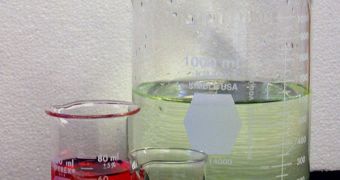Researchers from the US are currently in possession of what could be referred to as the first artificially-created genetic code in history. Currently located in beakers at the Foundation for Applied Molecular Evolution in Gainesville, Florida, the DNA-like chemical elements may form the first organism in history capable of Darwinian evolution. Biochemist Steven A. Benner, a scientist at the Foundation and the leader of the current research, says that while the molecules cannot yet make copies of themselves, which is a basic trait of life and evolution, getting them to do that could become a reality in a few years.
According to the research team, which has presented its achievements at the annual meeting of the American Association for the Advancement of Science (AAAS), the new organism is created from the four basic types of nucleotides that bind to compose our DNA (A, C, T, and G), alongside modified versions of these chemicals, which have been produced by reshuffling the chemical contents of the four original nucleotides. Basically, other than replicating, the new lump of life in Florida follows the same basic principles as any other living thing on Earth.
At this point in time, the only way for the new cells to make more of themselves is for the scientists to apply a process known as polymerase chain reaction (PCR) on them. The basics of the method are the same as those that take place inside our body when our own DNA replicates. Benner maintains that real artificial life appears when the artificial DNA starts doing it all by itself, without the aid of PCR, after completing a replication cycle.
The main goal of the research is to understand how life may have evolved on other planets. Scientists have believed for a long time that other celestial bodies may hold forms of life that could be based on a different type of biochemistry than our own. This new research has been funded by NASA, with the stated goal of getting a better clue of what it's actually looking for on other planets. Officials argue that future rovers could go right past signs of life and never know they were there. And that's a risk the American space agency cannot afford to take.

 14 DAY TRIAL //
14 DAY TRIAL //